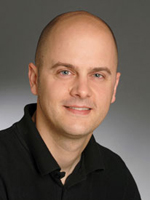since 2007 Group leader and faculty member at the Max Planck Institute of Biophysical Chemistry in Göttingen, Germany
2006-07 Post-doc at the Wellcome Trust Centre for Human Genetics, University of Oxford, UK
2002-06 Post-doc at the Max Planck Institute of Experimental Endocrinology Hannover, Germany
2002 PhD at the Department of Biochemistry, University of Fribourg, Switzerland
1999 Diploma in Biochemistry at the University of Hannover, Germany
|
|
|
Molecular mechanisms of circadian timekeeping, physiological and behavioural circadian rhythms, mouse genetics, clock disease interaction
|
|
Address:
Dept. Genes and Behaviour
MPI for Biophysical Chemistry
Am Fassberg 11
37077 Göttingen
Germany
phone: +49-551-201 2738
fax: +49-551-201 2705
e-mail: 
Further Information:
Circadian Rhythms Group
|
|
Lupi D*, Oster H*, Thompson S, Foster RG (2008) The acute light-induction of sleep is mediated by OPN4-based photoreception. Nat Neurosci. 11:1068-73
Peirson SN*, Oster H*, Jones SL, Leitges M, Hankins MW, Foster RG (2007) Microarray analysis and functional genomics identify novel components of melanopsin signaling. Curr Biol. 17(16):1363-72
Oster H, Damerow S, Kiessling S, Jakubcakova V, Abraham D, Tian J, Hoffmann MW, Eichele G (2006) The circadian rhythm of glucocorticoids is regulated by a gating mechanism residing in the adrenal cortical clock. Cell Metab. 4(2):163-73
Oster H, Leitges M (2006) Protein kinase C alpha but not PKCzeta suppresses intestinal tumor formation in ApcMin/+ mice. Cancer Res. 66(14):6955-63
Oster H, Baeriswyl S, van der Horst GT, Albrecht U (2003) Loss of circadian rhythmicity in aging mPer1-/-mCry2-/- mutant mice. Genes Dev. 17(11):1366-79
*: equal contribution
|
|
